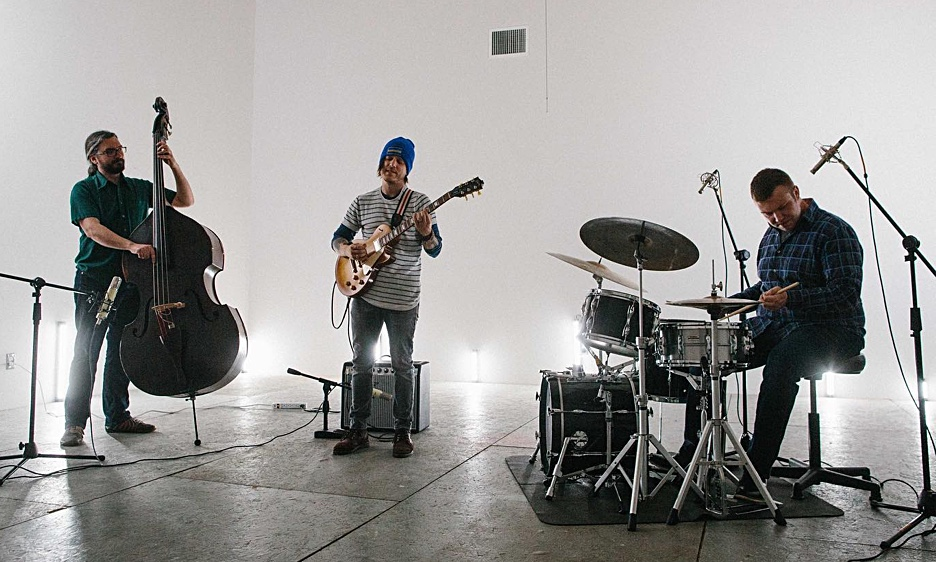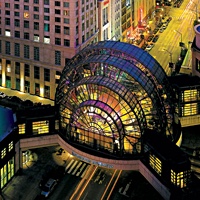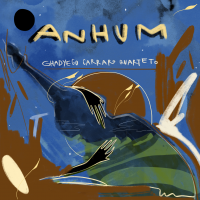Home » Jazz Articles » Catching Up With » Charlie Ballantine: Jazz Guitar Without Borders
Charlie Ballantine: Jazz Guitar Without Borders

In addition to an impressive body of original compositions on albums like Vonnegut and Cold Coffee, Ballantine also displays a great reverence for the jazz tradition through the inclusion of standards like "My One and Only Love," "'East of the Sun" and an entire double album dedicated to the music of Thelonious Monk, Reflections/Introspection: The Music Of Thelonious Monk (Green Mind Records, 2021).
All About Jazz: Before discussing your music, we should discuss some significant life changes. I understand that you will be moving to the Washington, DC area in the spring (of 2023) and that your wife, Amanda Gardier is joining the Navy Jazz Commodores band and left for basic training in mid-December. So I would love to hear about that and your future plans.
Charlie Ballantine: Hi Mark thanks for reaching out! Yes some big changes on the horizon. We will be leaving our beloved Indianapolis for some new adventures on the East Coast as soon as I'm finished with a month-long tour in the spring. She will be stationed in DC and we will likely be living in the Baltimore area. We are just really excited to dig into a great new scene and make some new memories. She has already done some interesting things, including playing at Vice President Kamala Harris' home for a celebration of International Women's Day.
AAJ: More details on the tour, please! Where are you going, and who is playing with you?
CB: Yeah I'll be playing trio with one of my Indianapolis groups with Jesse Wittman on bass and Richard "Sleepy" Floyd on drums. We will be traveling all over the Midwest through March hitting Chicago, Detroit, Cincinnati, Madison, and Minneapolis, and then also heading out east doing Buffalo, New York City, a couple of Canadian dates and a bunch of others I'm forgetting right now (laughing). Really looking forward to digging into the music on our new album Falling Grace and playing some new material as well.
AAJ: Once you're settled in, do you expect to be able to do be able to perform and record with Amanda again? I know she has frequently participated in your projects in the past.
CB: Yeah we will definitely always play together but I think now that we've been doing it so long we don't necessarily feel the pressure to put each other on every project. If it's a good fit we will always be willing to be on each others' projects. She's currently sitting on a really special album I did with her and The Bad Plus drummer Dave King so that's been the most recent collaboration.
AAJ: Sounds interesting. Was it a trio date, or are there additional players on it?
CB: It was a really interesting project with some incredible compositions by Amanda. It was a quartet with our guy Jesse Wittman on bass.
AAJ: Teaching has been part of your professional life (he had been a Professor of Guitar at the University of Indianapolis and Professor of Guitar at Marian University). Talk about that, and do you plan to continue after the move?
CB: I've been really lucky to have some great teaching jobs over the years at universities in Indianapolis and I've worked with so many great students. It's been an incredibly rewarding experience and I really learned a lot about the importance of passing on this tradition. But with the move to the East Coast I'm planning on taking a break from teaching for a while and focusing solely on performing and recording my own projects. I have some big plans for the next record that is scheduled to be recorded in NYC this summer (2023).
AAJ: Can you say more about your recording plans?
CB: I can't say too much other than I'll be recording with some of my heroes. I'll release more info as the recording dates get closer in August but all I can say is I'm very very excited about the project.
AAJ: Your recordings have regularly included contemporary music outside of the usual jazz repertoire. Life Is Brief: The Music Of Bob Dylan (Green Mind Records, 2018) made the inspiration outside of jazz clear, and other covers have included songs by Leonard Cohen, Tom Waits, the Pixies, and Dido. How do you choose these songs?
CB: I've always loved pop music and genres outside of jazz but a big inspiration for me putting that music on records has to do with the jazz musicians I grew up idolizing like Bill Frisell, The Bad Plus, John Scofield and even Wes Montgomery. The way those guys incorporated pop music into their music was always so cool to me. And the way they were able to approach it and make it their own and also maintain the integrity of the original is always something that I try to do. Basically, the songs I choose to do have to be important to me personally for one reason or another and also have to have a good melody so that it can be translated instrumentally. That's pretty much my focus when I'm thinking of covers to do.
AAJ: You have made several themed albums: Life Is Brief: The Music Of Bob Dylan; Vonnegut, inspired by novelist Kurt Vonnegut (Green Mind Records, 2020) and Reflections/Introspection: The Music Of Thelonious Monk. Talk about the decisions to organize albums this way and the creative process.
CB: I really just try to find inspiration wherever I can whether it's in books or other musicians or albums. I just try and stay open to creating all the time. My favorite part of that process is that when I'm arranging music like Bob Dylan's or Monk's I learn so much about myself as an artist and my own music starts to change through the process. When you really dig deep into someone else's music it informs everything you do from that point on. Especially with guys like Dylan and Monk who have such unique and distinct artistic voices.
AAJ: The Vonnegut project stands apart from the others because the inspiration is literary rather than musical. Say more about how your musical response was triggered: was it the prose itself, the themes of the novels, Vonnegut's approach to his art, or something else?
CB: The Vonnegut idea just happened naturally. I was reading his novel "Sirens of Titan" and I finished it very late one night. As soon as I finished, I put the book down and immediately wrote the song "Sympathy for Malachi Constant." I really loved how it all happened and how naturally the writing came to me so I decided to pick up another one of his books and see if it would happen the same way. And then the ball was just rolling so it was a really fun way to approach writing and putting together an album and it was totally unplanned. His writing just struck me creatively and it felt great. There were also some local commissions that were added to the project from the Vonnegut Museum and the Indy Jazz Fest.
AAJ: You have said "There's this sound I hear in my head, I get really close, but I can never quite attain it." Your guitar sound has largely avoided the use of electronic effects (apart from reverb). How has your approach changed since you started? Are you closer to your ideal sound?
CB: I think I've used fewer pedals and effects over time. The more I play the more comfortable I get with my sound. I don't think I'll ever be close to what my "ideal" sound is because it keeps changing as I grow and as I'm exposed to new music and new players. Every time I feel like I'm getting somewhere someone releases an album that turns my whole way of thinking upside down. It's just like "oh man I've been doing this all wrong! That's what I need to be doing" (laughing).
For the guitarists, we also discussed Charlie's guitars and creative choices. All of his earliest albums were recorded using a Fender Telecaster. For the Thelonious Monk album he played a Gibson Les Paul into a Fender Champ amplifier: to be sure to limit himself to that sound he did not even bring a pedal board into the studio. Later he used a Gibson ES-335 semi-hollow guitar for a while and recently has been playing Collings solid-body instruments.
Tags
Interview
Charlie Ballantine
Mark Sullivan
Thelonious Monk
John Scofield
Bill Frisell
ulian Lage
Amanda Gardier
Jesse Wittman
Richard "Sleepy" Floyd
Bad Plus
dave king
Wes Montgomery
PREVIOUS / NEXT
Support All About Jazz
 All About Jazz has been a pillar of jazz since 1995, championing it as an art form and, more importantly, supporting the musicians who make it. Our enduring commitment has made "AAJ" one of the most culturally important websites of its kind, read by hundreds of thousands of fans, musicians and industry figures every month.
All About Jazz has been a pillar of jazz since 1995, championing it as an art form and, more importantly, supporting the musicians who make it. Our enduring commitment has made "AAJ" one of the most culturally important websites of its kind, read by hundreds of thousands of fans, musicians and industry figures every month.



























